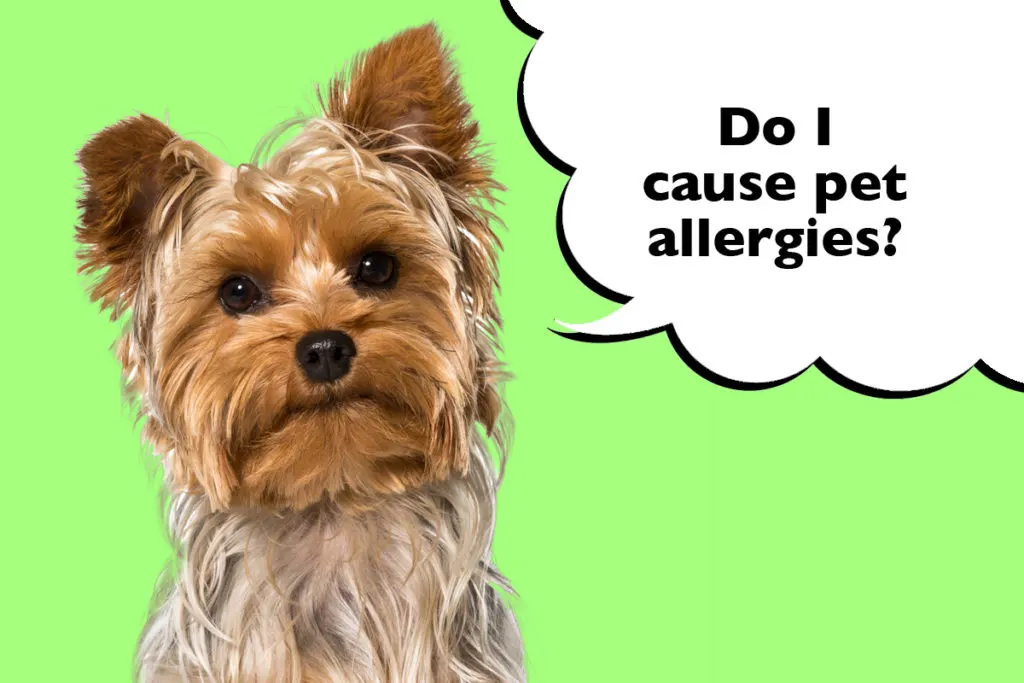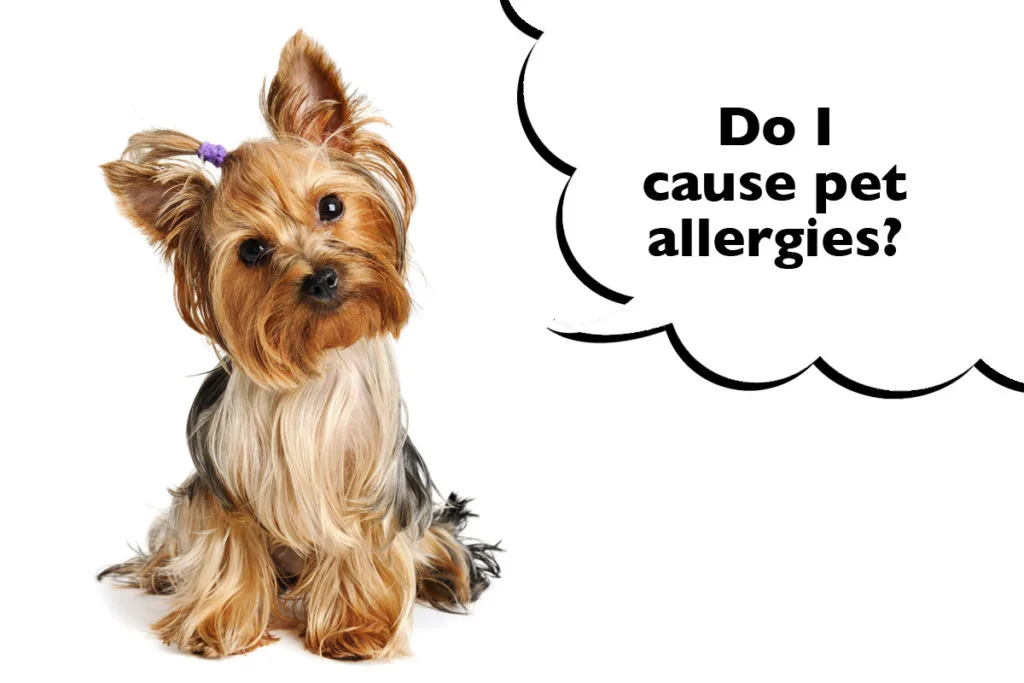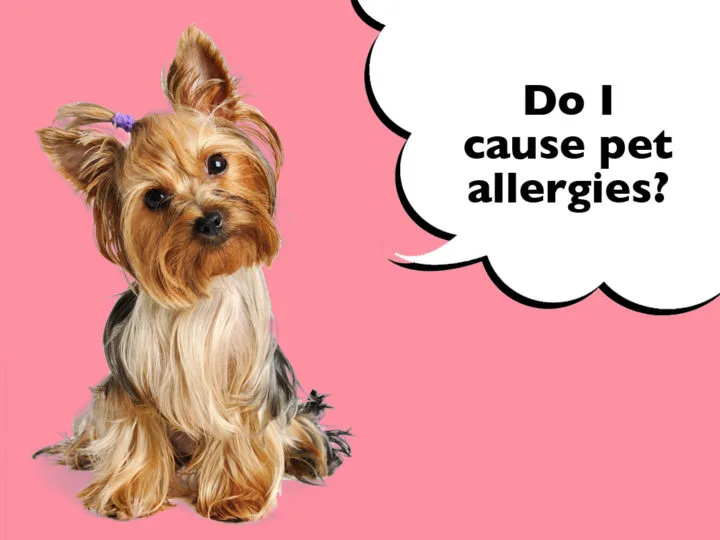Are you a pet allergy sufferer that would like to get a dog? Maybe you’ve heard that Yorkshire Terriers are a good breed for people with allergies? Here’s everything you need to know about whether Yorkshire Terriers are hypoallergenic.
Are Yorkshire Terriers Hypoallergenic? Yes, Yorkshire Terriers are considered a hypoallergenic breed. The American Kennel Club classes Yorkies as hypoallergenic because of their small size and low-shedding coat. This can mean they’re less likely to cause trouble for pet allergy sufferers but this will depend on the individual person and dog.
Read on to find out what the meaning of a hypoallergenic dog breed is, whether pet allergy sufferers can have allergic reactions to Yorkies, what causes pet allergies and what you can do to minimize them in the home.
Never use the advice in this article as a substitute for professional veterinary advice or treatment. I am NOT a Vet, qualified dog trainer or dog behaviourist. This article is based on research, personal opinion and experience of owning dogs over the last 12+ years.
What Is A Hypoallergenic Dog?
A hypoallergenic dog is considered less likely to cause allergic reactions for people with allergies.
Although no breed can be classed as entirely hypoallergenic, some seem to cause less trouble for pet allergy sufferers.
This is a very personal situation though, that depends on the particular person and dog.
Are Yorkshire Terriers Good For Allergy Sufferers?
Yes, Yorkshire Terriers can be a good choice for allergy sufferers. But, even though they’re less likely to cause a reaction, there’s no guarantee they won’t cause pet allergy symptoms for some people.
Weighing in at just 7lbs, their small size can also help keep pet allergies under control.
A smaller dog produces less dander, saliva, urine and faeces, which are the main cause of pet allergies.
Yorkies are also single coated too, which means they don’t have an undercoat to shed. Less shedding, means less dander and hair around your home, which can help keep allergies at bay.
However, the only way to know for sure if a Yorkshire Terrier will make your allergies flare is by spending time with them.
What Causes People’s Allergies To Yorkshire Terriers?
Although Yorkshire Terriers are considered a hypoallergenic breed, unfortunately some people can still be allergic to them.
Allergies to Yorkies are caused by:
Dander
Dander is the most common cause of pet allergies. All dogs, even those considered hypoallergenic, produce dander on their skin.
Thankfully, Yorkshire Terriers don’t make extreme amounts of dander, but they do naturally have some.
This is an unavoidable process because, when the body sheds hair, there’s usually dander attached to it.
Because dander is made up of such tiny particles, it can easily float around your home and settle on your furniture and carpets.
Saliva
Proteins in your Yorkshire Terrier’s saliva can cause allergic reactions in some people. It’s usually worse when they lick your bare skin, which is the most direct contact.
In severe pet allergy cases, it can be caused by stroking your Yorkie, after they’ve licked themselves, although this is more uncommon.

Excrement
Coming into contact with your Yorkshire Terrier’s urine or faeces can sometimes cause allergic reactions.
Similar to saliva, the proteins found in wee and poo can cause trouble for some pet allergy sufferers.
So be sure to wash your hands thoroughly after cleaning up any potty accidents.
How Can You Tell If You’re Allergic To A Yorkshire Terrier?
If you have any of these symptoms when you spend time with your Yorkshire Terrier, then it’s likely you could be allergic to them:
- Runny or blocked nose
- Blocked or painful sinuses
- Itchy, dry, red or watery eyes
- Skin rashes or irritations
- Dry, tickly throat
- Coughing and sneezing frequently
- Feeling tightness in your chest or breathlessness
What Can You Do If You’re Allergic To Your Yorkshire Terrier?
Although Yorkies are technically classed as a hypoallergenic breed, some people can still be allergic to them.
If you find that you’re reacting to your Yorkie, there are some things you can do to try and keep your allergies under control:
Vacuum Your Home Daily
Although Yorkshire Terriers don’t shed much hair, they still shed some and produce dander.
Vacuuming your home once a day can help remove any hair and dander, which can help keep your allergies at bay.
Dander is microscopic, so it can quickly become trapped in soft carpets, curtains, sofas and rugs, so make sure you concentrate on those areas.
Using a vacuum with a HEPA filter in can be even more helpful. They’re best for collecting more dander and hair than other vacuums.
Brush Your Yorkshire Terrier Daily
Daily brushing helps to remove any loose hairs from your Yorkshire Terrier’s coat.
This traps the hairs in the brush, instead of leaving them to fall out around your home. This is particularly important if your Yorkie’s coat is kept long.
Not only can this help keep your allergies under control, but it also keeps their coat and skin in better condition too.
Bathe Your Yorkshire Terrier Regularly
Bathing your Yorkshire Terrier once every two weeks can help keep their coat in better condition.
Make sure you use high-quality dog shampoos and conditioners that don’t aggravate their skin.
If you bathe them more frequently than this, it can cause skin irritation and dry skin – which may make them shed more!
Trim Your Yorkshire Terrier’s Coat
Keeping your Yorkshire Terrier’s coat cut short can help reduce your pet allergies.
Although they’ll still produce dander and shed their hair, there won’t be as much to fall out.
This also makes the grooming process more effective and quicker than when their coat is long.

Keep Your Yorkshire Terrier Out Of Your Bedroom
Although it might be tempting to have your Yorkshire Terrier sleeping in bed with you, this isn’t a good idea if you suffer from pet allergies.
You often spend the longest amount of time per day asleep in your bedroom without much ventilation. This can really make your allergies flare!
Plus, the soft fabrics of your bedding and pillows are magnets for dander and hair too!
So, if you suffer with pet allergies, it’s best that your Yorkie sleeps in a different room if possible.
Wash Your Yorkshire Terrier’s Bedding Weekly
Yorkshire Terriers love to be comfortable and they love snuggly blankets and squishy beds.
Unfortunately though, these are magnets for dander and hair, so they need to be washed weekly to keep on top of it.
Use a good-quality detergent and a hot wash cycle to get them cleaned up.
Consider using a pet laundry bag which traps the hair inside it, instead of it getting stuck in your washing machine. This way, the hair won’t be transferred to your own washing on the next wash.
Don’t Encourage Your Yorkshire Terrier To Lick You
Yorkshire Terriers are a loving breed that will probably want to kiss you!
As sweet as this may sound, it can worsen your allergies if you’re allergic to their saliva. The proteins in saliva can cause rashes and soreness to your skin.
If they do lick you, it’s best to wash the area as soon as you can, so it’s not in contact with your skin for long.
Wash Your Yorkshire Terrier’s Toys Often
If your Yorkshire Terrier’s saliva is causing your pet allergies to flare, then make sure to wash their dog toys regularly.
Soft toys in particular tend to allow the saliva to dry onto them. This means the proteins found in them will also dry and potentially transfer onto other surfaces in your home too.
This can make your allergies worse if you come into contact with them.
Feed Your Yorkshire Terrier Good Food
Good nutrition is crucial to keeping your Yorkshire Terrier’s skin and coat healthy. The healthier they are, the less hair they’ll lose.
Avoid any dog foods with lots of cereals or any artificial ingredients. This goes for their treats too!
Speak To Your Doctor About Medication
Your doctor will be able to advise you on any medications that can help your pet allergies.
There are antihistamine tablets, creams and nasal sprays available on prescription to help control your allergy symptoms.
If your allergies are mild, you may be fine to take over-the-counter products, so speak to your pharmacist for advice!
So there you have it! According to the AKC, Yorkshire Terriers are considered a hypoallergenic dog breed. They’re small in size and single coated with a low-shedding coat. This may make them a better option for people with pet allergies. However, this’ll very much depend on the individual person and dog, so it’s best to spend time with them first before making that commitment.
What do I do next?
Thank you for reading all the way to the end of this article, your support for my blog means everything to me! If you found this article helpful, please kindly share below. Thank you!

